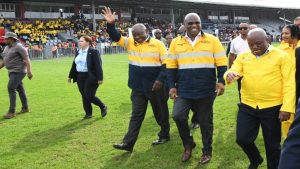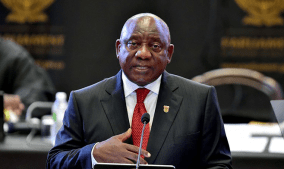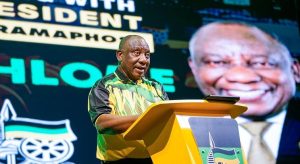This has been an eventful year for President Cyril Ramaphosa after assuming power as the country’s sixth democratically elected leader.
His administration face among others, a faltering economy that plunged the country into a technical recession, the rocketing unemployment and Eskom‘s rolling blackouts, which saw the country losing R50 billion a day. However, Ramaphosa remains confident the tide will turn.
The President has vowed to end poverty in the next 25 years insisting that, working together with all social partners, a society that all South Africans long for is possible.
With South Africa experiencing a stagnant growth, dwindling investment and increasing unemployment, Ramaphosa embarked on a vigorous investment drive in a bid to attract R1,2 trillion worth of domestic and international investment in the next five years.
He has appointed investment envoys that include former Finance Minister Trevor Manuel and businesswoman Phumzile Langeni.
Last month, the President organised the Second Investment Conference, which attracted well over R300 billion worth of investment.
He said government is working hard to create a business environment that is conducive for investment.
But the past six months have not been smooth sailing for the president. South Africa remains the most unequal society in the world with unemployment stubbornly high at almost 30%.
Some state owned enterprises are also on the brink of collapse with the South African Airways (SAA) and Eskom remaining an albatross on his neck.
The national carrier is broke and has since being put under business rescue, while Eskom is struggling to keep the lights on.
Rolling blackouts recently cost the economy at least R50 billion a day, resulting in calls for the power utility’s privatisation.
Eskom lost R26 billion this financial year alone and it is projected to lose R33 billion in the 2020-21 financial year.
The solution to the crisis, at least according to the President, is to separate the cash stripped power utility into three entities. After having at least 10 CEOs in the last decade, Ramaphosa sought to ensure stability at the power utility by appointing Andre De Ruyter as the power utility’s new Group CEO.
However, Ramaphosa was strongly criticised by some unions and political parties, saying De Ruyter’s appointment is a step back in pursuit of the transformation agenda and the start of privatisation of Eskom.
But the President is steadfast no public assets will be privatised under his presidency.
And as the year 2019 draws to an end, Ramaphosa’s administration is still being accused of failing to resolve the many issues facing some South Africans.
These include the failure to address the plight of the Khoisan people, who have been camping outside the Unions Buildings in Pretoria, demanding to be recognised as the first indigenous people of this land and the longstanding issue of e-tolls in Gauteng.






